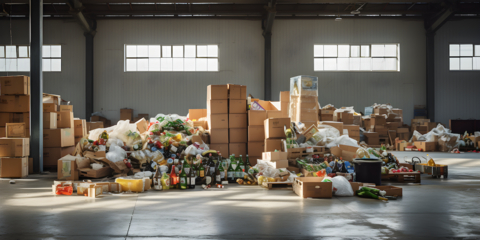Data reveals nearly one-third of all food produced for human consumption is lost and wasted across the entire supply chain each year
Flock Freight®, the only FreightTech company creating a smarter, more sustainable supply chain by pooling freight at scale, today published a new study1 that sheds light on the significant impact of freight inefficiencies on America’s food and beverage (F&B) waste crisis and rising prices. The study, conducted in collaboration with Drive Research, investigates how these inefficiencies are escalating the problem of F&B waste and its corresponding detrimental effect on consumers, businesses, and the environment.
This press release features multimedia. View the full release here: https://www.businesswire.com/news/home/20230914460469/en/

Copyright, Flock Freight 2023
America has a food and beverage waste problem, with nearly 40% of all food in the country going to waste each year. While end consumers play a part in this issue, F&B waste extends beyond untouched food at the table to include goods damaged during transportation.
The study found that freight damage, loss, and delays are costing shippers millions of dollars annually, eating into profits and leading to both economic and environmental losses. These inefficiencies are the leading cause of waste in F&B supply chains.
Key findings from the study include:
- In 2022, almost half of F&B shippers reported fully wasted shipments due to damage and loss, and 100% of shippers reported partially wasted shipments.
-
Delayed shipments, the third top contributor to waste, can have varying impacts depending on the size of the company. In some cases, delayed shipments have forced 46% of shippers to discard entire shipments, resulting in nearly 2.4 million pounds of wasted food per shipper annually.
-
This is the equivalent of:
- Over 2 million meals2
- Nearly 20,000 gallons of diesel3
- 753 metric tons of greenhouse gas emissions from landfills4
-
This is the equivalent of:
- Damage and loss costs the average F&B shipper more than $6 million annually in 2022.
- Transportation delays negatively impacted sales by an average of 8% in 2022, with a ripple effect that increased the volume of wasted goods and strained relationships with customers.
- Transportation costs are the number one factor in rising F&B prices, with 77% of shippers identifying them as a driving force behind pricing changes.
“The results of this study are staggering. The amount of food wasted per shipper annually due to freight inefficiencies is not just a financial loss, but also an ethical and environmental concern that demands our immediate attention,” said Chris Pickett, COO at Flock Freight. “Flock’s shared truckload offering, FlockDirect, is an immediate solution. By addressing these inefficiencies head-on and leveraging advanced technology, we are not only saving businesses millions but also making a substantial impact on reducing food waste and lowering end consumer prices."
By offering shared freight space on direct and terminal-free routes, FlockDirect® significantly reduces damage, improves reliability, and saves on costs—ultimately leading to less F&B waste. Leveraging Flock Freight’s patented technology, and powered by machine learning, FlockDirect moves goods along optimized routes, saving shippers $200k in wasted, delayed freight and $400k in OTIF fees. These routes also avoid the high risk of damage common with standard LTL shipping, delivering a 99.8% damage-free rate and saving millions of dollars annually.
To read the full report, please click here.
1 The data supporting the content and objectives set forth in this paper come from an online survey conducted by Drive Research, a third party not affiliated with Flock Freight. The survey took an average of 24 minutes to complete and included 44 questions and received 200 responses. Fieldwork for the survey began on June 14 and ended July 7, 2023. Target industries included food and beverage companies that do not ship exclusively produce. Target participant titles varied based on the size of the business (i.e., transportation buyers, load managers, transportation managers, VPs of supply chain, directors of transportation, logistics managers). A strong mix of company sizes to segment the data by the market included a distribution of $10M to $99M annual revenue, $100M to $499M annual revenue, and $500M or more annual revenue. With a probabilistic sample, a total of 200 responses at the 95% confidence level offers a 7% margin of error. If the survey were conducted with another random pool of 200 respondents, the results would yield within +7% or -7% of the stated totals in the reports. The margin of error can be used as a guideline to understand the reliability of these results.
2 1.2 lbs of food per meal. Source: Feeding America
3 55 truckloads, 44,000 lbs each, 2,000 mile routes. Sources: EPA equivalency calculator, Flock Emissions White Paper
4 Assuming it’s produce, landfilled compared to composted. Soure: Natur-Bag food waste calculator
About Flock Freight
Founded in 2015, Flock Freight is a FreightTech company reinventing the supply chain through smarter, more sustainable shipping solutions. By leveraging its patented technology, Flock Freight matches locations, schedules, and compatible shipments, finding the best options to pool freight at scale among billions of possible combinations. As one of the first freight shipping companies to earn a B Corporation certification, Flock Freight’s solutions for moving fuller trucks on optimized routes results in reduced carbon emissions by up to 40% compared to traditional shipping methods. Flock Freight was recently recognized as one of TIME’s Most Influential Companies in the World and as a CNBC Disruptor 50. To learn more about the company, offerings, and careers, visit flockfreight.com.
View source version on businesswire.com: https://www.businesswire.com/news/home/20230914460469/en/
Contacts
Flock Freight | press@flockfreight.com





